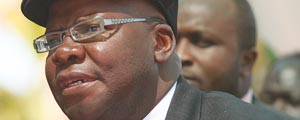
ZIMBABWE will today vote for a new central government on the backdrop of a myriad of challenges confronting the economy.
BERNARD MPOFU/VICTORIA MTOMBA
Already the economy has slowed down amid expectations of further decline by year-end.
Finance minister Tendai Biti has revised economic growth rate to 3,4% from 5% projected at the start of the year due to political uncertainty.
The stakes are high for the two main political parties — Zanu PF and the Prime Minister Morgan Tsvangirai-led MDC-T. The MDC-T has raised the red flag on the electoral process alleging vote rigging.
But, Zanu PF denied the allegations, a development that could result in a contested poll and subsequent political uncertainty should the MDC-T lose.
For Zanu PF, a win would extend the party’s hegemony. The victory would reinforce President Robert Mugabe’s legacy, who — according to the new constitution — will have one last chance to stand as a presidential candidate after today’s elections.
During his 33-year grip on power, Mugabe’s leadership has been a tale of mixed fortune — from the liberation struggle, to one of Africa’s longest serving Presidents. Today’s elections may be Mugabe’s last fight before he passes on the baton.
- Chamisa under fire over US$120K donation
- Mavhunga puts DeMbare into Chibuku quarterfinals
- Pension funds bet on Cabora Bassa oilfields
- Councils defy govt fire tender directive
Keep Reading
On the other hand, Tsvangirai seems determined to dethrone Mugabe. Today’s election would be his third attempt to the throne since 2002. Unlike in 2008, this year’s election is about egos as the campaign trail was marked by slurs, promises and lies.
In the midst of this tug-of-war, the business community is sitting on the fence. While political players have launched ideologically different election manifestos, business seems unimpressed.
For Zanu PF, the indigenisation and economic empowerment policy which compels foreign-owned companies to sell 51% shareholding to locals is its trumpcard to stimulate economic growth.
The MDC-T, on the other hand, envisages a $100 billion economy by 2018, anchored on foreign direct investment.
The Welshman Ncube-led MDC sees devolution as a catalyst to economic growth.
Judging by the reluctance of business organisations to buy into these manifestos, analysts contend that a hybrid post-election policy inclusive of all party manifestos could ease anxiety in the business sector.
“It’s highly improbable that we believe in a manifesto that seeks to make the rest of the people entrepreneurs. This is what the Zanu PF manifesto entails, while MDC-T is focused on attracting investment.
It’s not an easy process as investors have to look at various indices before they make a decision,” a local economic analyst Brian Ngwenya said.
“Whoever gets into power should look at both the manifestos to appease the employed and unemployed people. We cannot have one without another to appease the population of Zimbabwe and its diversity.”
The Confederation of Zimbabwe Industries said it was ready to engage and collaborate with a government which crafted policies that promoted capital inflows into the country, economic growth and employment-creation that was led by the private sector.
Independent economic analyst John Robertson said the post-election government should guarantee investor protection to ensure economic growth, something critics said Zanu PF was not ready to do.
“This is what is missing in the manifestos. We will not get any improvement in the economy if investments are not secure.
Investments create employment and bring confidence into the economy,” Robertson said.
When all is said and done, Zimbabwe decides!











